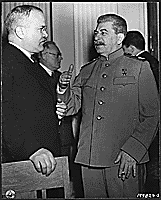
When FDR recieved what he believed was British agreement to the principle of a cross-channel invasion in 1942 it allowed him to bring up the matter with the Soviets. He wrote to Stalin on April 11, 1942 to ask if he could discuss "a very important military proposal" with Soviet Foriegn Minister Molotov and a Soviet General. Stalin agreed to send Molotov to both London and Washington. FDR wanted Molotov to come to the U.S. first, but he went to visit London instead. In the discussions that Churchill conducted with Molotov, he expressed British reluctance to mount an invasion of Western Europe in part due to a lack of landing craft. Churchill argued that mounting an invasion that would not be entirely effective would be disaster for the U.S. and Britain. Upon the conclusion of thier discussion, Churchill and Molotov signed a treaty. FDR requested that Churchill send him a summary of thier discussion regarding Bolero (buildup before the invasion) so that he could be prepared for his own talks with the Soviet Foriegn Minister. In sending the summary, Churchill revealed the British apprehension regarding the cross-channed invasion that had not been previously discussed. Churchill also sent Lord Mountbatten to meet with FDR in order to "explain the difficulties of 1942." FDR's talks with Molotov were conducted between May 29 and June 1 1942. Molotov agreed with the idea that a strong attack in 1943 was better than a risky one in 1942. FDR was determined to see the second front open in 1942, he originally wanted to set the date at August of 1942, but agreed to leave the date more flexible. (14)
